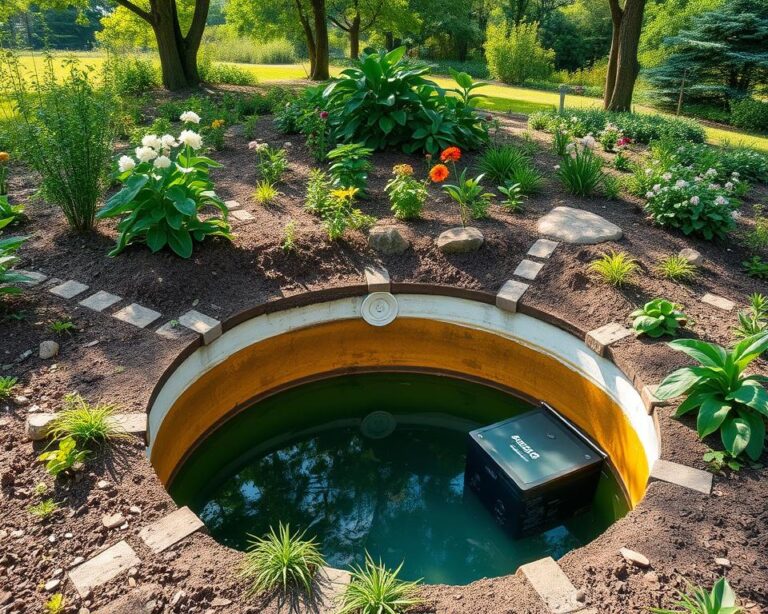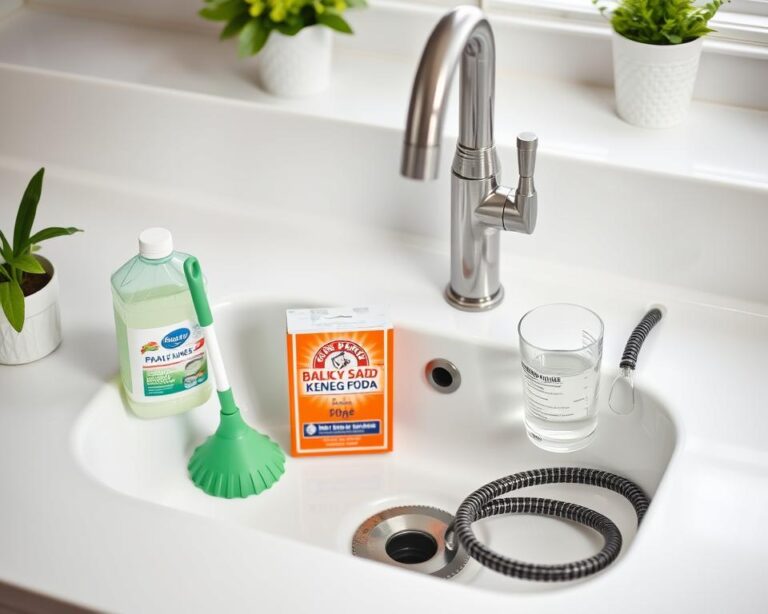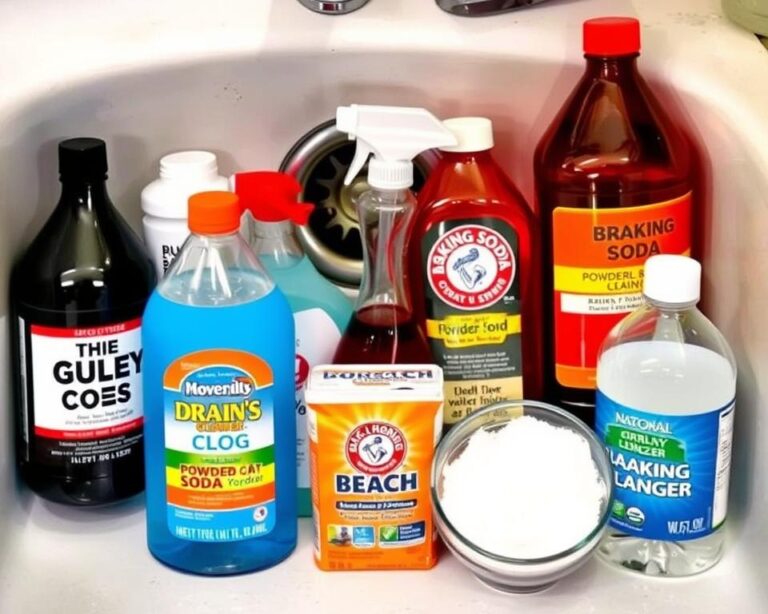Are you tired of stubborn clogs disrupting your daily routine? Discover the power of homemade drain cleaners, a safe and eco-friendly alternative to conventional chemical products. By tapping into basic pantry items, these natural drain cleaners offer effective solutions that not only clear blockages but also protect your plumbing and the environment. Unlike store-bought options, which can harm your pipes and ecosystem, homemade formulas are gentle yet effective. A homemade drain cleaner can clear tough clogs with a few tries while being safer and less expensive than chemical cleaners1. Baking soda and white vinegar, two common ingredients, produce a fizzy reaction that helps unclog drains2. These cleaners not only save you money but are also incredibly easy to make and use, setting the stage for a cleaner, healthier home.
Understanding Why Homemade Drain Cleaners Work
Homemade drain cleaners are appreciated for their ability to unclog and maintain drains without the harsh effects of chemical alternatives. The combination of baking soda and vinegar is particularly effective due to the chemical reaction that generates carbon dioxide and water, which helps lift debris from pipes. When exploring how homemade drain cleaners work, this fizzing action can loosen materials stuck in the plumbing.
Boiling water adds to this process by exerting additional pressure, helping to drive the loosened debris further down the drain. Natural drain cleaner efficiency can be enhanced by using common household ingredients like these, which are often more environmentally friendly than commercial options that may contribute to long-term plumbing issues. Interestingly, over 60 years of market presence show the effectiveness and ongoing usage of brands like Liquid Plumr® and Drano®, yet many users are unaware of the potential risks involved with these products.
When homemade solutions fail, it’s essential to recognize that serious clogs may require professional assistance, particularly clogs originating from tree roots or damaged pipes. This underscores the importance of understanding the science behind homemade methods to appreciate their value as an alternative solution. For more practical applications of homemade solutions, check out this guide on homemade drain cleaners that outlines various methods and their effectiveness3.
Essential Ingredients for Homemade Drain Cleaners
Creating an effective homemade drain cleaner requires a few essential ingredients, commonly found in your kitchen. Baking soda is a key player, serving as an abrasive that scrubs away residue. When combined with vinegar, the acidity of vinegar helps to break down clogs, making this duo powerful for tackling buildup in your plumbing. Salt is another important ingredient; it enhances the abrasiveness of baking soda, making it particularly effective against stubborn drains4. Dish soap is included in the recipe as a degreaser, effectively breaking down greasy substances that often contribute to clogs.
The combination of baking soda, salt, and other non-toxic drain cleaner supplies can make for a potent mixture in clearing blockages. For example, mixing salt and baking soda and letting it sit in the drain before flushing with hot water helps tackle tougher clogs4. Homemade solutions are not just effective; they are eco-friendly as well, ensuring that you take care of your plumbing without harming the environment.
Simple Recipes for Effective Drain Cleaning
Creating a homemade drain cleaner recipe is both economical and effective for tackling clogged drains. One of the most popular DIY drain unclogger methods involves combining equal parts baking soda and vinegar. This mixture creates a foamy reaction that can effectively break down clogs. Pour this combination down the drain and follow it with boiling water for optimal results. It’s essential to note that this method can create a lot of foam and pressure, potentially damaging older pipes or causing further clogs5.
For those dealing with grease clogs, a simple solution can be made using one cup of dish soap followed by two cups of hot water. This DIY drain unclogger method works by breaking down the greasy buildup within the pipes6. Another effective recipe combines one cup of apple cider vinegar and one cup of baking soda. Pouring this down the drain can efficiently break down clogs and neutralize unpleasant odors5.
If you’re tackling more persistent issues, consider a mixture of borax, vinegar, and salt. To create this, you will need 1/2 cup of borax powder, 1/2 cup of table salt, and 1 cup of white vinegar. After pouring this solution down the drain, allow it to sit for at least 30 minutes for the best results7. You can also blend 1/4 cup of baking soda with 1/4 cup of salt and 1 tablespoon of cream of tartar for a powerful cleaning effect that is safe for the environment6.
Each recipe varies in waiting time, ranging from 15 minutes to an hour depending on the solution used. Incorporating these DIY drain unclogger methods before calling a plumber can be a wise and cost-effective approach to maintaining healthy plumbing systems6. As you experiment with these homemade drain cleaner recipes, remember to account for the effectiveness of each method to ensure excellent results every time.
Precautions When Using Homemade Cleaners
While homemade drain cleaners can be safer compared to chemical alternatives, proper handling is crucial. Users must exercise caution to avoid combining different types of cleaners, as this may lead to dangerous chemical reactions8. When utilizing boiling water, take care to prevent splashes that could cause burns, especially if pouring from a high distance9. Maintaining adequate ventilation is important, particularly when using vinegar, to avoid discomfort from its potent odor.
These safety tips for homemade drain cleaners not only promote effective cleaning but also ensure user safety. The fizzing action of popular homemade solutions like baking soda and vinegar is effective at breaking down minor clogs, yet awareness about the potential hazards involved in their application remains essential8. Following these precautions when using DIY cleaners enhances both the effectiveness and safety of the cleaning process.
When to Use Homemade Drain Cleaners
Homemade drain cleaners serve as an ideal solution for various plumbing issues. Understanding the signs to use homemade drain cleaners can help maintain the health of your plumbing system. Typical indicators include sinks that take longer than usual to drain, unpleasant odors emanating from the drains, or visible buildup around the openings. These signs clarify when it’s prudent to opt for homemade solutions rather than harsh chemical alternatives, as 77% of plumbers agree that chemical drain cleaners often do more harm than good due to potential damage to pipes and hazardous gas release10.
The effective use of natural cleaners, such as baking soda and vinegar, can tackle minor clogs but might not be effective for severe blockages due to the resulting chemical reaction producing mainly salty water and carbon dioxide11. Regular maintenance using these natural cleaners can prevent many clogs. A proactive approach involving common household items like vinegar and baking soda serves well in 88% of homemade cleaner recipes10.
Using boiling water, a tactic found in 54% of successful homemade recipes, can effectively clear up grease-related clogs10. If issues persist despite initial treatments, consider employing a plunger, effective in 68% of cases, or seek professional assistance if all else fails10. Keeping these insights in mind will help ensure your drains remain clear and functioning optimally.
Limitations of Homemade Drain Cleaners
While homemade drain cleaners can be effective for mild to moderate clogs, there are significant limitations of DIY drain cleaners that homeowners should be aware of. Severe blockages, particularly those caused by physical obstructions or deeper plumbing issues, may not respond to these homemade solutions. In many cases, enzymatic drain cleaners fail to address tough clogs, necessitating the need for professional intervention when to call a plumber becomes apparent12.
Additionally, it’s essential to recognize that over-reliance on homemade cleaners can disrupt the plumbing system. Liquid drain cleaners, even those marketed as safe, pose risks to pipes, with potential damage occurring over time13. Homeowners who encounter persistent issues may find that utilizing physical tools like snakes can inadvertently harm older plumbing systems14.
For those who find that their DIY efforts are ineffective, reliable plumbing companies can provide the expertise needed to effectively address more serious drainage problems. Thus, understanding these limitations is crucial for maintaining a healthy plumbing system and ensuring timely resolution of clogs when more help is necessary.
How to Use Homemade Drain Cleaners Effectively
To maximize the effective usage of homemade drain cleaners, establish a bi-weekly maintenance routine. Using a combination of baking soda and vinegar is a great tip for DIY drain cleaning, as it creates a fizzy reaction that can help loosen debris. Before applying any cleaner, clear out visible debris to enhance the success rate of your solution. Allow the solution to work for about ten minutes, followed by flushing the drain with boiling water to ensure proper clearing of blockages1.
Regularly using boiling water can keep drains clear of buildup. Monthly maintenance with different combinations, such as baking soda and lemon juice, is beneficial for maintaining clear pipes15. Consider employing tools like a wet-dry shop vacuum for stubborn clogs or even snaking the drain when necessary1. Avoid putting items like grease, eggshells, and fibrous foods down the drain, as these can lead to clogs15.
Always stay observant for signs that may require plumbing intervention, such as unusual sounds or persistent clogs, indicating it might be time to consult a professional if homemade solutions fall short16.
Other Natural Drain Maintenance Tips
In addition to utilizing homemade cleaners, several practices can greatly enhance natural drain maintenance. Regularly removing hair from drain covers and avoiding pourable grease down sinks are essential17. Simple steps like placing a drain strainer can effectively catch debris before it enters the plumbing system. Rinsing drains with hot water can also help prevent clogs, especially after heavy use18.
Being aware of common clogging contributors, such as food remnants and soap buildup, assures a proactive approach to drain upkeep. The fact that plumbing experts recommend cleaning drains at least annually emphasizes the importance of routine maintenance17. For those looking for comprehensive support, various tips for keeping drains clear offer significant insights that align with eco-friendly practices.
Eco-Friendly Benefits of Homemade Solutions
Using homemade drain cleaners presents numerous eco-friendly benefits of homemade cleaners. These alternatives minimize reliance on harsh commercial products, which often contain harmful chemicals, such as sodium hydroxide, that can corrode pipes over time19. Many common household items, like baking soda, white vinegar, and salt, not only work effectively but also showcase an environmentally safe cleaning solution, reducing pollution risks for local water sources19. Natural drain cleaners fully biodegrade, making them a more sustainable option compared to synthetic chemicals20.
When utilizing homemade cleaners, individuals reduce their environmental impact, with surveys indicating that 92% of Americans aim to lessen their footprint during cleaning endeavors19. Additionally, these solutions are often cost-effective, eliminating over 90% of blockages within an hour, similar to harsher chemical brands20. Using a combination of baking soda, vinegar, and essential oils can help effectively deodorize pipes while avoiding chemicals that could damage plumbing systems21.
Furthermore, regular maintenance with homemade solutions is crucial as it can reduce the need for frequent professional interventions and helps in preventing the accumulation of clogs, particularly those caused by grease and small food particles21. Integrating these environmentally safe cleaning solutions into daily practices not only protects plumbing systems but also contributes to a cleaner environment21.
Frequently Asked Questions about Homemade Drain Cleaners
When exploring DIY drain cleaning solutions, many homeowners come across common inquiries about homemade drain cleaners. One frequent question involves their effectiveness against different types of clogs. Research indicates that while DIY cleaners can be effective for minor clogs, more severe blockages often require professional intervention to avoid plumbing damage and costly repairs22. Understanding the limitations of these natural alternatives is essential for making informed choices.
Safety considerations are another topic of interest in FAQs about homemade drain cleaners. Many people wonder if ingredients like baking soda and vinegar are safe for all plumbing systems. Generally, these natural ingredients are non-toxic and eco-friendly, making them suitable alternatives to harsh chemical cleaners23. However, users should still be cautious, especially when combining different substances, as reactions may occur. Regular maintenance is key to preventing clogs and ensuring longevity in plumbing systems.
Lastly, some might ask about alternative cleaning solutions if homemade options are insufficient. For persistent issues, professional drain cleaning is advisable, as experienced plumbers can efficiently handle complex problems using specialized tools and techniques2223. It’s beneficial to balance DIY methods for routine maintenance with professional services for serious concerns, thus optimizing the health of your plumbing system.
FAQ
Are homemade drain cleaners effective for all types of clogs?
Homemade drain cleaners are generally effective for mild to moderate clogs, especially those caused by soap buildup or food waste. For severe blockages, particularly those involving physical obstructions, professional plumbing services may be necessary.
What are some common ingredients used in homemade drain cleaners?
Common ingredients include baking soda, vinegar, salt, and dish soap. These pantry staples combine to create effective, non-toxic solutions for unclogging drains.
Is it safe to mix different homemade drain cleaner recipes?
It’s best to avoid combining multiple cleaners, as this can cause harmful reactions. Stick to one recipe at a time for the safest results.
How often should I use homemade drain cleaners?
Regular maintenance is key! Using homemade drain cleaners bi-weekly can help prevent clogs and keep your pipes clear.
Can homemade drain cleaners damage my plumbing?
No, when used correctly, homemade drain cleaners are safe for most plumbing systems. They are eco-friendly and non-toxic, making them a healthier alternative to harsh chemical cleaners.
What should I do if my homemade drain cleaner doesn’t work?
If your homemade cleaner doesn’t resolve the clog, it may be due to a more serious plumbing issue. In this case, consider contacting a professional plumber for assistance.
Can I use boiling water with homemade cleaners?
Yes, using boiling water can enhance the effectiveness of your homemade drain cleaning solution by helping to flush away loosened debris. However, be cautious to prevent burns.
Are there any precautions I should take when using homemade drain cleaners?
Yes, ensure adequate ventilation when using vinegar due to its strong odor, and avoid mixing different cleaners to prevent harmful reactions. Always follow the recipes carefully.
How can I maintain clear drains beyond using homemade cleaners?
To maintain clear drains, regularly remove hair from drain covers, flush with hot water, and avoid pouring grease down sinks. Additionally, consider using a drain strainer.
What are the environmental benefits of homemade drain cleaners?
Homemade drain cleaners reduce the reliance on chemical products that can harm the environment. They are cost-effective, non-toxic, and promote sustainability in daily maintenance practices.



